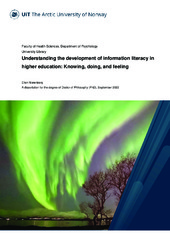| dc.contributor.advisor | Dahl, Tove Irene | |
| dc.contributor.author | Nierenberg, Ellen | |
| dc.date.accessioned | 2022-11-04T08:42:58Z | |
| dc.date.available | 2022-11-04T08:42:58Z | |
| dc.date.issued | 2022-11-25 | |
| dc.description.abstract | Information literacy (IL) is the ability to recognize when information is needed and to find, evaluate, and effectively use this information. The aim of this doctoral research was to study the development of IL in undergraduates over three years, including their knowledge, skills, and attitudes, and the relationships among the three. Mixed methods were employed to better understand the totality of students’ IL development, and this research demonstrates the value of employing this methodology in the field of IL.
Four psychometrically evaluated tools were developed to measure students’ IL knowledge, skills, and attitudes: a 21-item IL test (knowing); two authentic assignments to assess skills in evaluating and using information sources (doing); and a questionnaire to measure students’ interest in being or becoming information literate (feeling). These freely available IL-assessment tools contribute to both IL research and practice. The interest questionnaire can be employed to measure the development of other interests as well, and thereby represents a contribution also for those who study interest.
This research fills gaps in the IL literature by studying interactions among several facets of IL over time. It follows IL development longer than most studies and introduces the measurement of interest – an important motivator for learning – into the field of IL. It is also the first study to explore transformative IL learning in students.
Findings show that (1) IL is a multifaceted construct; (2) students’ IL knowledge and skills increase and intercorrelate more with time, as do their IL attitudes when measured by interest and IL’s usefulness and importance for them. Interviews revealed that (3) students gradually become more interested in being or becoming information literate people, and (4) some experience a change in identity as a result of becoming more information literate, which indicates that transformative IL learning can occur. | en_US |
| dc.description.doctoraltype | ph.d. | en_US |
| dc.description.popularabstract | Information literacy (IL), the ability to find, evaluate, and effectively use information, is commonly taught in higher education. Information literate people think critically and can better detect fake news and conspiracy theories, and students who have these skills can correctly cite their information sources and thereby avoid plagiarism. In this dissertation, mixed methods were employed to explore the development of IL knowledge, skills, and interest in undergraduates over three years. Findings show that students’ knowledge and skills increase significantly, while the more subjective experience of interest varies more. Some students experience changes in identity and thereby transformative learning as their IL competence grows. Freely available tools were developed to measure IL, including a test, two assignments, and a questionnaire. Educators can use these instruments to assess student IL learning. This dissertation thereby makes contributions to both IL research and practice. | en_US |
| dc.identifier.uri | https://hdl.handle.net/10037/27245 | |
| dc.language.iso | eng | en_US |
| dc.publisher | UiT The Arctic University of Norway | en_US |
| dc.publisher | UiT Norges arktiske universitet | en_US |
| dc.relation.haspart | <p>Paper 1: Nierenberg, E., Låg, T. & Dahl, T.I. (2021). Knowing and doing: The development of information literacy measures to assess knowledge and practice. <i>Journal of Information Literacy, 15</i>(2), 78–123. Also available in Munin at <a href=https://hdl.handle.net/10037/22067>https://hdl.handle.net/10037/22067</a>.
<p>Paper 2: Dahl, T.I. & Nierenberg, E. (2021). Here’s the TRIQ: The Tromsø Interest Questionnaire based on the four-phase model of interest development. <i>Frontiers in Education, 6</i>, 716543. Also available in Munin at <a href=https://hdl.handle.net/10037/23033>https://hdl.handle.net/10037/23033</a>.
<p>Paper 3: Nierenberg, E. & Dahl, T.I. (2021). Is information literacy ability, and metacognition of that ability, related to interest, gender, or education level? A cross-sectional study of higher education students. <i>Journal of Librarianship and Information Science</i>. Also available in Munin at <a href=https://hdl.handle.net/10037/23548>https://hdl.handle.net/10037/23548</a>.
<p>Paper 4: Nierenberg, E., Solberg, M., Låg, T. & Dahl, T.I. Knowing, doing, and feeling: A three-year, mixed-methods study of undergraduates’ information literacy development. (Submitted manuscript). | en_US |
| dc.relation.isbasedon | <p>Paper 1: Nierenberg, E., Låg, T. & Dahl, T.I. (2020). Replication Data for: Knowing and doing: The development of information literacy measures to assess knowledge and practice. DataverseNO, V2. <a href=https://doi.org/10.18710/L60VDI>https://doi.org/10.18710/L60VDI</a>.
<p>Paper 3: Nierenberg, E. & Dahl, T.I. (2021). Replication Data for: Is information literacy ability, and metacognition of that ability, related to interest, gender or education level? DataverseNO, V1. <a href=https://doi.org/10.18710/HQOJHS>https://doi.org/10.18710/HQOJHS</a>.
<p>Paper 4: Nierenberg, E. (2022). Replication Data for: Knowing, Doing, and Feeling: A three-year, mixed-methods study of undergraduates’ information literacy development. DataverseNO, V1, <a href=https://doi.org/10.18710/SK0R1N>https://doi.org/10.18710/SK0R1N</a>. | en_US |
| dc.rights.accessRights | openAccess | en_US |
| dc.rights.holder | Copyright 2022 The Author(s) | |
| dc.rights.uri | https://creativecommons.org/licenses/by-nc-sa/4.0 | en_US |
| dc.rights | Attribution-NonCommercial-ShareAlike 4.0 International (CC BY-NC-SA 4.0) | en_US |
| dc.subject | Library and information science | en_US |
| dc.subject | Information literacy | en_US |
| dc.title | Understanding the development of information literacy in higher education: Knowing, doing, and feeling | en_US |
| dc.type | Doctoral thesis | en_US |
| dc.type | Doktorgradsavhandling | en_US |


 English
English norsk
norsk
